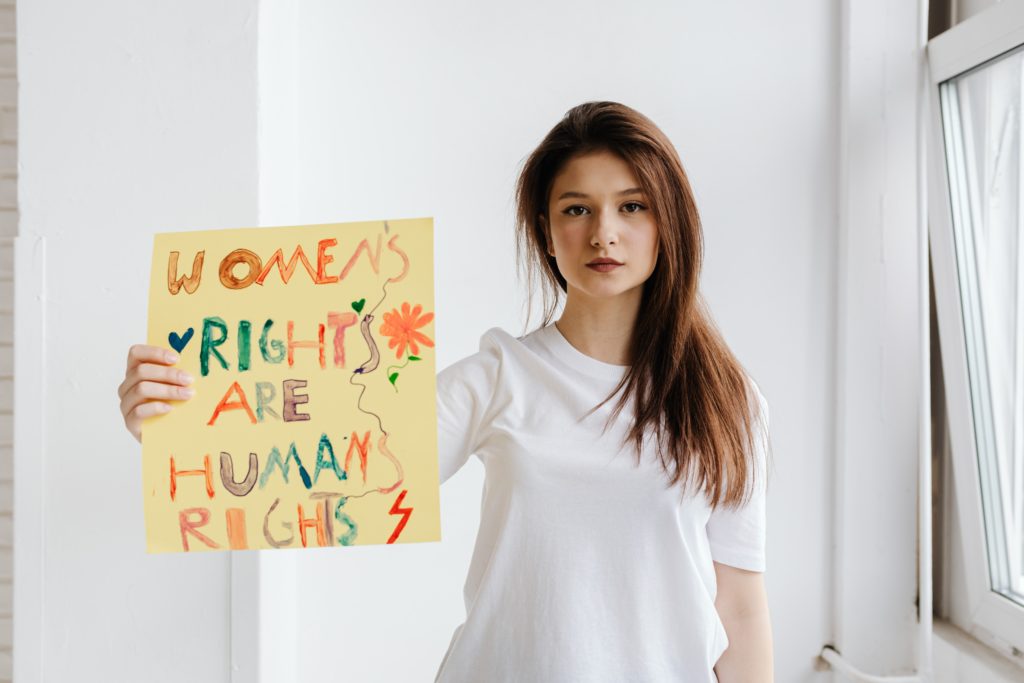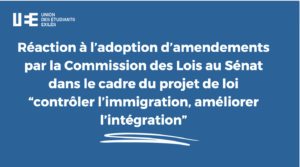The dual struggle of exiled women in France: for their rights, and their professional and academic integration
Introduction to International Women’s Day: a global holiday celebrated annually on March 8 as a focal point in the women’s rights movement:
March 8th is a day of international mobilization for women’s rights which originates from the feminist struggles of the early 20 century led by socialist and communist activists in Europe. The first “International Women’s Day” took place on March 19, 1911 on the initiative of the Socialist International Women. The movement did not spread beyond the socialist bloc until the formalization in 1977 of a day for women’s rights on March 8 by the United Nations. Since then, demonstrations and actions such as strikes have been organized every year around the world by feminist collectives and associations in order to claim equal rights and to improve the living conditions of all women.
A quick sketch of the situation of exiled women in France:
Exiled women represented 51.8% of international migrants in France in 2017, which became a stable figure since 2008. It is also known since the 1990s that they have autonomous migratory projects and independent motivations, thus, in 2020, 56% of exiled women who arrived in France were single[1].
In 2018 [2], half of the women who requested protection in France came from Africa, a quarter came from Europe, and the rest came from Asia or America. Depending on the origin of those women, the level of education and language can be very unequal, the fact remains that 38% of exiled women have a diploma in higher education[3].
Finally, exiled women are more exposed to economic and administrative insecurity and therefore to violence and health problems (physical and mental). For example, due to the fear of losing their residence permit, they do not dare to file a complaint and those who do are regularly discriminated against because of their status. And, because of their status as women, they are also more likely to be victims of violence, particularly during their migratory journey.
At the intersection of discrimination: the professional and academic integration of exiled women:
From our experience, during our permanence, we observe that fewer exiled women have access to higher education in France. Although, this has changed abruptly with the arrival of many Ukrainian students (53% of the people we support were women in 2022, whereas they were in the minority until then). The integration of exiled women, whether professionally or academically, is made more difficult by their dual status of both women and exiled people: they combine inequalities and discrimination. Several factors represent a barrier to their integration in these two areas and the first being related to the material conditions. In fact, their precariousness is exacerbated by particularly difficult access to financial resources, housing and language, as well as greater isolation and greater exposure to violence.
First of all, the language barrier is one of the first factors of discrimination because it prevents a clear understanding of job search procedures and methods. In the case of academics, this limits the training courses for which they can apply (many courses require a minimum level of B2 or even C1 French), and in the professional field, this prevents them from seizing any opportunity that present itself to them because many jobs (sales, teaching, etc.) require a higher level of French. Finally, even if they have a good or acceptable command of the language, they can be victims of glottophobia and be refused positions because of their accents.
Plus, exiled women are confronted – like most exiled people in France – with the problem of recognition and equivalence of diplomas. This process being complicated and long, in particular for non-European diplomas, they are prevented or delayed in resuming their studies and disqualified from the job market. The first consequence is professional disqualification and relegation to low-value and low-paid professions. Thus, due to their low level of French and the non-recognition of their diplomas, exiled women are penalized in obtaining a job [4] and they are overrepresented in the health sector (4 % of them were assistant nurse in 2017 [5]), accommodation, catering and social work. According to a 2020 INSEE survey, 19% of the women who exiled from third-world countries were employed in the health sector (compared to 5% for men) and, in 2017, 4% of them were cleaners [6]. It should be noted that exiled women are more affected by unemployment: again according to INSEE, 21% of them were unemployed in 2017 compared to 8.5% of French women. This plunges them into a significant precariousness, causes a loss of financial autonomy and therefore creates greater dependence on people who provide for them, such as family or spouse. But this also has harmful psychological effects because these women have to resign themselves from changing professions for those who were already working or to give up their future projects and dreams for those who wanted to enter French universities.
Moreover, exiled women often have very little network, whether social or professional, which is detrimental to their integration and reinforces the difficulties of professional or academic integration. In the case of employees, they will not have the advantage of being recommended to employers or the help necessary in their job search. For exiled students, this translates into isolation within the university, poor access to information, particularly about socio-cultural activities and exam procedures, and a lack of support.
In addition, there is also the violence they suffer from because of their gender, whether it is during their migratory journey during which they are the first victims of sexual violence or in their host country. A 2019 survey carried out by the DSAFHIR reveals that 75% of immigrant women have suffered some form of serious violence throughout their life and 46% report abuse that has occurred in France [7]. They are also more likely than exiled men to experience harassment, abuse, sexist and sexual violence whether it is at work, in the everyday environment, at university, or at home. In addition, they often do not dare to file a complaint due to the fear that this will negatively impact their residence permit application, and they are also forced to remain in dangerous situations (domestic violence, harassment at work, etc.) because of their great economic precariousness. Not to mention that a discrimination such as moral harassment is doubled by the racial discrimination of which they are victims. All of this has a heavy psychological impact and the victims of this type of violence are only rarely taken care of by medical services due to the cost or lack of information. This obviously has detrimental effects on socio-professional or academic integration.
Exiled women also face more difficulties accessing housing. However, the lack of access to housing jeopardizes the pursuit of studies for exiled people and puts them in a very precarious situation, especially women who are more exposed to violence and discrimination if they remain on the street. Mothers are also more exposed to poor housing or lack of housing because of their greater precariousness. One of the frequent solutions to get out of this situation is prostitution, as highlighted in a report by the Abbé Pierre Foundation from 2023 [8].
Finally, motherhood can be an obstacle in the search for employment or higher education because mothers cannot always use childcare services due to their economic situation or get help from relatives if they are isolated. This prevents them from taking courses at the university or doing certain jobs. In addition, if they are pregnant, it will be even more difficult for them to access the workforce because of the reluctance of employers to hire women who will then take maternity leave.
Consequently, exiled women accumulate discrimination, they are more affected by precariousness and isolation to which can be added violence due to their gender. Their professional and academic integration is therefore particularly difficult, which explains their over-representation in low-value and poorly paid professions.
The support of UEE to exiled women:
In 2022, women represented 53% of the 1580 people supported by the UEE, the participation of women has increased this year due to the arrival of Ukrainian students. Of the 924 people who were able to enroll in university, 584 (63%) were women.
Female students tend to enroll in lower degrees. Indeed, they represent 55% of admissions to bachelor’s degree and DU Passerelle and nearly 60% of those to DAEU but only 32% of admissions to master’s degree.
140 female students whom we have supported in their search for accommodation found a place at the CROUS or in solidarity housing and 466 obtained a scholarship (ASAA, BSC or acquired university mutual aid scholarship).
The main problems they encounter are, first of all, the language barrier, then access to scholarships, administrative problems, access to housing and finally isolation.
Our recommendations for a better reception of exiled female students in higher education in France.
Access to higher Education:
- Guarantee a dignified, equitable, and free access to higher education regardless of the administrative status, origin, nationality, and gender of the person returning to study.
- Guarantee access without prejudice and discrimination based on real or supposed origin, nationality, gender and any other form of discrimination.
- Establish regular diagnostics on access to higher education for exiled women.
- Produce disaggregated statistical data to establish the needs of different audiences, especially women.
- It is necessary that university agents (administrative and teaching staff in particular), including CROUS agents, be duly trained on the specific situation of exiled students to guarantee a reception and orientation adapted to their needs and without discrimination.
- Higher educational institutions must meet the different needs of exiled students to facilitate their participation in student life, guarantee equality by providing the means and work tools for their success in the academic career.
- Give exiled women who are resuming their studies the freedom to choose the field of study they want, without certain training being imposed because of their gender and the needs of the job market in France.
Registration
- Guarantee the right to the recognition of diplomas and skills for free university registration: it is essential that the institutions put in place procedures for recognizing the level of studies of applicants and those without a diploma, for example by interviews (VES, VAPP).
- Set up a reception plan with a gender and intersectional approach, which provides for individualized and quality support, specific methodological courses, mentoring projects between French-speaking students and exiled students, single-sex accommodation, activities specific to develop social ties and break isolation.
- Set up daycare systems during class for all single student mothers.
Learning French
- Guarantee the right to learn French beyond basic communication, and unconditional access to academic or professional training for newcomers.
- Guarantee quality language training, free of charge and adapted to the academic needs of exiled women: the offer of French courses must lead to a diploma and be recognized by universities for exiled people wishing to return to higher education.
Material living conditions
- Opening of CROUS scholarships and accommodation to all students enrolled in higher education, regardless of their nationality and administrative status.
- Entitle the CROUS grant and other aid (such as RSA or ADA) to be combined at the full rate.
- Establish “refugee CROUS referents” and train them for a specific reception of exiled women returning to their studies with a gender and intersectional approach. A list of these referents must be updated, published and made accessible in order to be able to have direct and facilitated access for exiled students.
- Guarantee access to safe, comfortable and sustainable housing throughout the years of study at an affordable price for exiled students in order to guarantee them material, health and psychological security.
- Guarantee housing adapted to the needs of exiled students, especially those who have dependents (children, grandparents, etc.)
To illustrate this article, we offer you a series of four portraits of exiled women students who are resuming their studies, we will publish one portrait per week during the month of March on our site.
Sources:
L’insertion professionnelle des femmes migrantes en France | EPALE (europa.eu)
Les réfugiées et les migrantes | ONU Femmes (unwomen.org)
https://rm.coe.int/femmes-migrantes-fr-coe-150520-/16809f1558
[2] https://www.ofpra.gouv.fr/libraries/pdf.js/web/viewer.html?file=/sites/default/files/2022-10/rapport_dactivite_2018.pdf-compressed.pdf (p. 110 et 112)
[3] https://rm.coe.int/femmes-migrantes-fr-coe-150520-/16809f1558
[8] https://www.fondation-abbe-pierre.fr/sites/default/files/2023-01/REML2023_WEB.pdf



